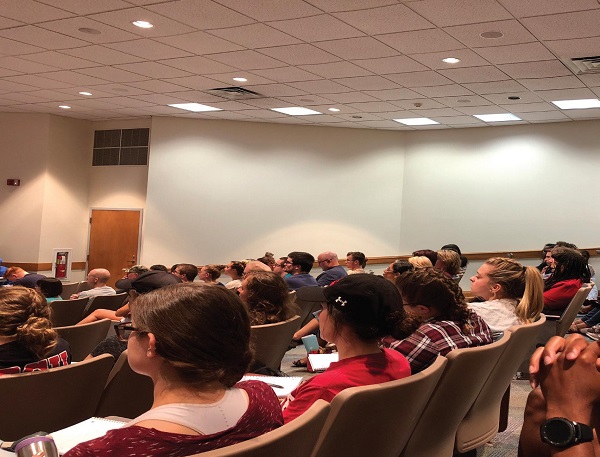
By Lauren Hernandez
Contributing Writer
On Sept. 27, Dr. Anthony“Tony” Drago presented for the Provost’s Colloquium. With every seat filled and several people standing, the presentation was on a hard-hitting subject: suicide.
Drago is not only one of East Stroudsburg University’s psychology professors, but he is also the head of the department.
Along with teaching, he runs a private practice where he focuses on suicide.
Before he was a professor, Drago revealed that as a director of mental health services at what is now the Lehigh Valley Health Network, he witnessed a suicide.
This drove him to help those with depression and suicidal thoughts.
“Suicide is everyone’s concern and one of the most preventable deaths,” said Drago, “suicide is a permanent solution to a temporary problem.”
He also noted that September is suicide awareness month, which coaligned with the timing of his colloquium.
He opened with what he simply referred to as the “bridge story.”
He asks the audience what bridge is 75 stories high? Where it only takes four seconds to hit the water at 75mph? What bridge has 1,300 documented suicides? The answer is the Golden Gate bridge.
Drago focuses on one particular survivor that jumped off that bridge, Kevin Hines.
He mentions that Hines, along with 16 survivors studied, is among the majority that thought to themselves – “I want to live” as they were airborne.
Not one survivor tried again.
According to Drago, there are different levels to suicide. There are suicide attempts with and without injuries.
Interpersonal action is when a person indicates self-destructive desire.
Suicidal ideation, commonly known as suicidal thoughts, is another level of suicide.
Non-suicidal self-injury, also known as self-harm, is a common level of suicide.
Instrumental suicidal behavior is where people force you to believe they are suicidal, but do not actually have any intention to end their life.
Drago stresses that suicides are never “successful”, but complete.
To show the audience that mood disorders, which are usually associated with suicide, are more common than we think, he presented celebrities who struggled with depression.
Among this list was J.K. Rowling, Billy Joel, Heath Ledger, Robin Williams and Kurt Cobain.
The audience gasped as people they admire showed up on the screen.
For a moment, Drago focused on what is called suicide contagion.
This is when a family member, peer or idol commits suicide, and others decide they need to kill themselves as well.
Specifically, after Kurt Cobain’s death, 68 more suicides were reported. Suicide contagion is still a problem today.
Later, Drago took the time to discuss suicide myths. Those myths being no one can stop suicide, those who are suicidal keep plans to themselves and signs become clear too late.
He debunked all of these myths by telling the audience that all it simply takes a good listener and someone who really cares.
Mental health on college campuses became the topic of discussion, and the audience became anxious when Drago revealed the statistics.
Drago told the audience that although finals week is hard on college students, most suicides are due to social problems.
Those suicides are also grouped in the first month of college. He warns that the likelihood of suicide increases with age.
As the presentation comes to a close, Drago told the audience that there is only one wrong way to ask someone if they’re suicidal: “you’re not suicidal, are you?”
This question makes the person feel cornered, like their feelings are invalid.
When asked what advice he would give ESU students about dealing with mental health and suicidal thoughts, Drago said, “Having conversation and dialogue about suicide helps. Dispelling myths of suicide helps. Paying attention to others in distress helps. Not tolerating and confronting any form of bullying-type behavior toward others helps. Offering assistance helps. Everyone can make a difference.”
For services available on campus, the Department of Counseling and Psychological Services (CAPS) is located on the second floor of the Flagler-Metzgar Building.
CAPS has four licensed psychologists on staff to help students with any concerns or issues they may be having.
CAPS hours are Monday-Friday from 8 a.m. to 4:30 p.m. Their phone number is 570-422-3277.
If you or someone you know is seeking help, you can also contact the Carbon-Monroe-Pike Mental Health and Developmental Services at their crisis lines 570-992-0879, or 800-849-1868.
You could also contact the National Suicide Prevention Lifeline at 1-800-273-8255.
Email Lauren at:
lhernande2@live.esu.edu

